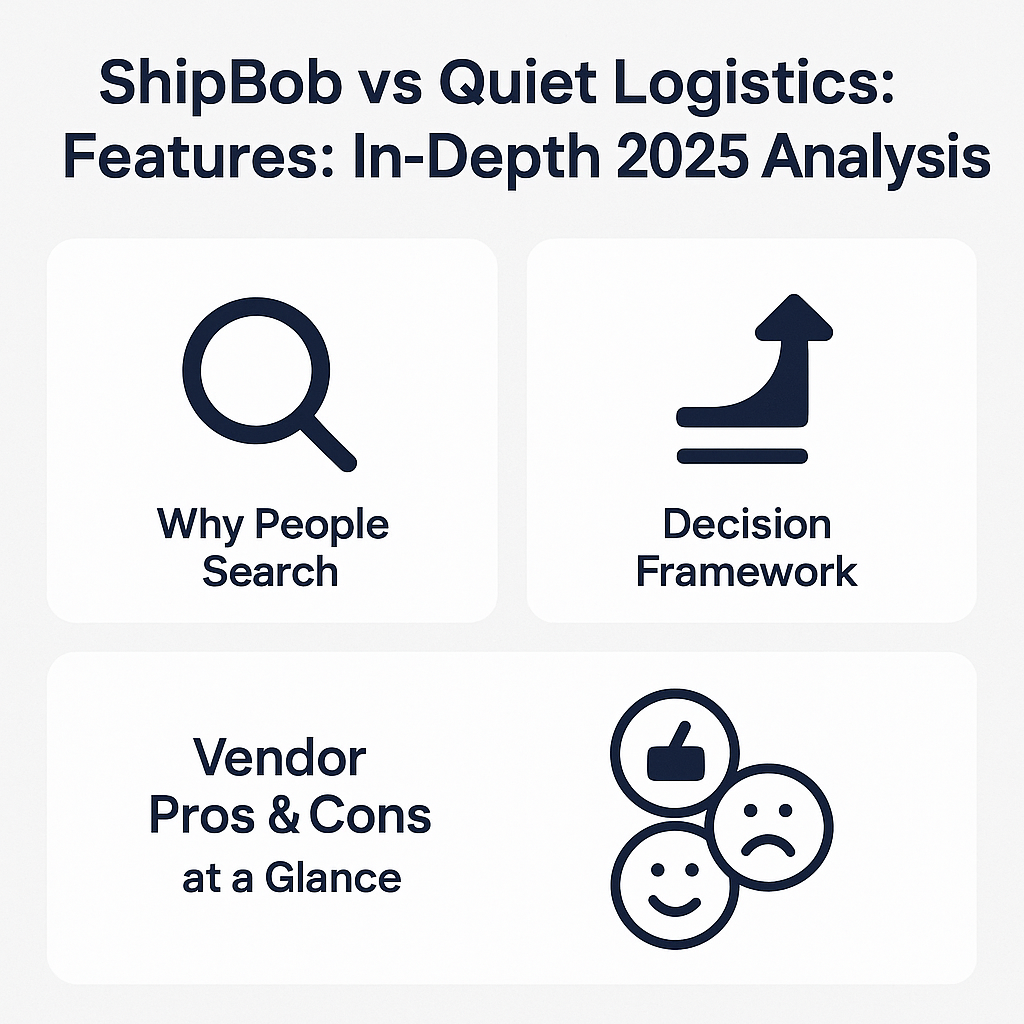
ShipBob vs Quiet Logistics Features
Choosing between ShipBob and Quiet Logistics can be daunting, especially when each offers unique features that could make or break your logistics strategy. In this guide, we delve into the specifics of what each provider offers, helping you make a confident decision.
Why People Search ‘shipbob vs quiet logistics features’ in 2025
In 2025, the logistics landscape is more dynamic than ever, driven by AI forecasting and sustainability trends. Businesses are keen to align their supply chains with these trends, making the choice between ShipBob and Quiet Logistics crucial. With AI-driven insights, companies can predict demand more accurately, while sustainability initiatives are becoming non-negotiable for consumer loyalty. As such, logistics managers and ecommerce founders are scrutinizing features that support these priorities.
- AI forecasting is a game-changer; ensure your 3PL supports predictive analytics.
- Sustainability isn’t optional; look for providers with green initiatives.
- Consider scalability to future-proof your logistics strategy.
Decision Framework: How to Evaluate
When evaluating ShipBob vs Quiet Logistics, it’s essential to consider factors that align with your business goals. Start by assessing your current logistics needs and future growth plans. Consider how each provider’s features can support your objectives, such as speed, cost-effectiveness, and technological integration.
Additionally, evaluate the flexibility of each provider. Can they adapt to seasonal fluctuations or unexpected demand spikes? Understanding these dynamics will help you choose a partner that aligns with your operational needs.
- Assess current logistics needs and future growth plans.
- Evaluate flexibility and adaptability to demand changes.
- Consider technological integration and support for AI and sustainability initiatives.
Vendor Pros & Cons at a Glance
- ShipBob Pros: Extensive network, user-friendly platform, strong tech integration.
- ShipBob Cons: Higher costs for small businesses, limited customization.
- Quiet Logistics Pros: Focus on sustainability, flexible solutions, strong customer support.
- Quiet Logistics Cons: Smaller network, less tech-driven than competitors.
ShipBob offers a robust network and tech-forward solutions, making it ideal for tech-savvy businesses. However, it may not be the best fit for smaller companies due to cost. Quiet Logistics, with its sustainability focus and flexibility, appeals to businesses prioritizing eco-friendly practices, though it may lack the technological edge of ShipBob.
Pricing & Total Landed Cost: What Really Moves the Number
Pricing is a critical factor when choosing a 3PL, and understanding the total landed cost can reveal hidden expenses. ShipBob generally offers competitive pricing for larger volumes, but smaller businesses might find the costs prohibitive. Quiet Logistics, on the other hand, provides more tailored pricing models that can be advantageous for businesses with specific needs.
- ShipBob: Competitive for high volumes, potential hidden fees.
- Quiet Logistics: Tailored pricing, better for niche needs.
- Consider total landed cost, including shipping, handling, and storage.
While ShipBob might seem cost-effective for larger operations, Quiet Logistics’ tailored pricing can offer better value for businesses with unique requirements. Always calculate the total landed cost to avoid surprises.
Feature-by-Feature Comparison
- Network Reach: ShipBob has a larger network; Quiet Logistics offers regional specialization.
- Technology: ShipBob excels in tech integration; Quiet Logistics focuses on sustainability tech.
- Customization: Quiet Logistics offers more customization; ShipBob has standardized solutions.
ShipBob’s extensive network and tech capabilities make it a strong contender for businesses seeking scalability and innovation. Quiet Logistics, with its customization and sustainability focus, may better suit companies looking for tailored solutions.
Scenario Playbook: Who Should Choose What?
- High Volume Shippers: ShipBob’s extensive network and tech integration are ideal.
- Sustainability-Focused Businesses: Quiet Logistics offers eco-friendly solutions.
- Custom Solution Seekers: Quiet Logistics provides more tailored options.
For high-volume shippers, ShipBob’s network and technology are advantageous. However, businesses prioritizing sustainability or requiring custom solutions might find Quiet Logistics more aligned with their goals.
Onboarding & Risk Mitigation
Onboarding with a new 3PL can be a complex process. ShipBob offers a streamlined onboarding experience with robust tech support, which can be beneficial for tech-savvy teams. Quiet Logistics, while potentially slower to onboard, provides personalized support and risk mitigation strategies that cater to businesses with specific needs.
- ShipBob: Fast onboarding, strong tech support.
- Quiet Logistics: Personalized support, risk mitigation strategies.
- Consider the complexity of your operations when choosing a provider.
Choosing between a fast onboarding process and personalized support depends on your business’s operational complexity and resource availability. ShipBob’s tech-driven approach suits fast-paced environments, while Quiet Logistics’ personalized strategies benefit businesses needing tailored support.
Expert Take
Having worked with both ShipBob and Quiet Logistics, I recall a client who initially chose ShipBob for its tech integration but later switched to Quiet Logistics due to their sustainability initiatives. This decision was driven by their evolving brand values and customer expectations. The lesson here is to align your logistics partner with your long-term business vision, considering both current needs and future aspirations.
Further Reading
FAQs
How do pricing models differ for ‘shipbob vs quiet logistics features’?
ShipBob generally offers competitive pricing for larger volumes, while Quiet Logistics provides more tailored pricing models suitable for niche needs.
What support model should I expect?
ShipBob offers robust tech support, while Quiet Logistics focuses on personalized customer service and risk mitigation.
Which industries benefit most?
High-volume shippers benefit from ShipBob, while sustainability-focused businesses find Quiet Logistics advantageous.
How long does onboarding take?
ShipBob offers faster onboarding, whereas Quiet Logistics may take longer but provides more personalized support.
Can multi-node reduce both cost and transit time?
Yes, utilizing a multi-node strategy can optimize both cost and transit time, depending on the provider’s network reach.
Next Steps
Ready to choose your 3PL partner? Compare quotes or schedule a consultation to find the best fit for your logistics needs.

Leave a Reply